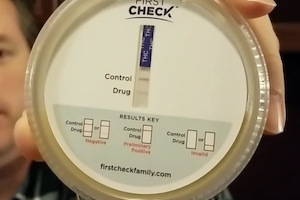10 Common Misconceptions About CBD

Since starting this blog I have had friends and family tease me about all sorts of things from becoming a hippie to breaking the law. To me, this really highlights all the misconceptions out there about Cannabidiol or CBD. I’m going to try my best to set the record straight…
Here are the most common misconceptions about CBD that I’ve come across so far? The most common misconceptions about CBD are:
- CBD will get you high
- CBD is only from marijuana
- CBD will make you fail a drug test
- CBD is addictive
- CBD is illegal
- CBD makes you clumsy
- CBD is a gateway drug
- CBD only works when THC is present
- CBD is just a step towards legalizing marijuana
- CBD kills short-term memory
Some of these misconceptions are related to each other but I’ll address each one individually. Many of these misunderstandings are rooted in a basic confusion or lack of knowledge between the differences between CBD and THC. And some of it is simply that people have decided cannabis is bad and they aren’t willing to have an open mind to learn about CBD. Hopefully, this article will help set the record straight on a few things.
#1 – CBD will get you high
There is only one molecule in marijuana that is known to be psychoactive and that molecule is Tetrahydrocannabinol. Often abbreviated to THC, tetrahydrocannabinol is the molecule that makes people “high”. It accomplishes this by binding directly to certain receptors in the body. Many of these receptors are located in the brain and triggers the release of high levels of dopamine. Dopamine is the pleasure hormone in the body that makes us feel good. It can produce a feeling of euphoria if enough is released. This is how THC gets someone high.
CBD, on the other hand, impacts the body in a different way. Rather than binding directly to receptors, CBD helps the bodies normal processes work more efficiently and in some cases slows down processes that are working abnormally fast. It doesn’t trigger a release of increased dopamine in the brain. But it does produce greater mental clarity, calms stress and anxiety, along with a host of other benefits. These benefits do help people feel better if they’ve been dealing with these problems for a long time. But it isn’t considered a “high” like most people think of when they think of marijuana.
It’s actually true that if CBD is present in high enough levels with THC it actually reduces the high people experience from marijuana. Marijuana has historically had a higher CBD to THC ratio and subsequently didn’t produce as much of a psychoactive effect. Then sometime around the 1970s, growers of marijuana decided to start selecting strains with less CBD and more THC so they could produce a stronger, more psychoactive product. CBD won’t get you high, that is what THC does.
#2 – CBD is from marijuana
CBD is found in both marijuana and hemp. And don’t get confused, hemp and marijuana are NOT the same plants. This is a very common misunderstanding. These plants are related since they are both members of the cannabis family. But they are indeed different plants. The key difference is that hemp has less than 0.3% THC in it. Marijuana can have much higher levels of THC. Some strains can produce up to 25% THC.
Because both hemp and marijuana contain THC it is possible to get CBD from both sources. Because hemp is legal in more places, including the USA, just about all of the CBD product you can buy online are derived from hemp.
#3 – CBD will make you fail a drug test
Another concern people have is that they will fail a drug test if they consume CBD, even if it’s derived from hemp. This is extremely unlikely to happen as long you’re buying your CBD from reputable suppliers (check out our recommended products page.) The normal urine-based drug test that most employers require their employees to take can detect THC at 50 nanograms per milliliter of urine. That’s actually a pretty small amount, but it’s still incredibly unlikely that you would test positive.
It’s important to realize that THC doesn’t come out of your system all at once. It comes out slowly over time. So you’d never get all the THC in your system to come out into one sample of your urine. It’s also important to note that this low level of THC in your system would never produce any sort of mind-altering/psychoactive effects. It isn’t like you’re trying to trick the drug test, because you aren’t getting high with hemp-derived CBD products.
If you’re still concerned about this, there are products available that have been processed in such a way that all the THC has been removed. These products are typically referred to as CBD isolates. These products will not cause you to fail a drug test.
#4 – CBD is addictive
CBD has been shown to not be addictive. For a drug to be addictive it has to have certain characteristics. First, it has to stimulate the pleasure center of the brain. This is done by releasing high levels of dopamine. Second, your body typically builds up a tolerance to the drug which requires that you take more and more of it in order to get the same pleasure or euphoric effect. CBD leads to neither of these conditions.
I did a blog post specifically about this topic that may be of interest to you if this is a concern you have. But real quick, if you were to take CBD every day for an extended period of time, you would have no physical dependence on it, you could stop without any difficulties. The only difficulty would be that the symptom that caused you to start taking CBD in the first place may come back.
#5 – CBD is illegal
I’ll admit, this one is a little bit confusing at best. And there’s no way I can address every country in the world in this post or any post for that matter. Laws are changing really fast around cannabis in general so it’s hard to keep up. I live in the United States so I’ll address this country mostly. Check the laws in your country before buying any CBD products so you don’t get in trouble.
In the United States, the 2018 Fram Bill will once and for all legalize hemp and all of its derivative products. This bill will remove any confusion surrounding the legality of CBD. Unfortunately, it is stalled in Congress and probably won’t be passed until late in the year after the mid-term elections. So does this mean CBD isn’t yet legal? It’s a little tricky to piece it all together. I’d say you won’t get arrested or have any trouble with law enforcement if you buy or use hemp-derived CBD. And here’s why…
The 2014 US Farm Bill made it legal to grow hemp in states with certain restrictions. First, the grower had to be associated with a university or they had to obtain a permit as part of a state-operated pilot program. This could only be allowed in states where hemp wasn’t illegal at the state level. What this Farm Bill did not do is allow for the transportation of hemp or any of its derivatives (like CBD oil) across state lines.
But the 2016 Omnibus Appropriations bill, aka “The Funding Bill”, contained a provision in section 763 that says:
“None of the funds made available by this act or any other act may be used… to prohibit the transportation, processing, sale or use of industrial hemp that is grown or cultivated in accordance with section 7606 of the Agricultural Act of 2014, within or outside the State in which the industrial hemp is grown or cultivated.”
This made it clear that the federal government was not going to go after anyone growing hemp, as long as they were doing it according to the 2014 Farm Bill, and they also wouldn’t go after anyone buying and using hemp products.
Then, similar language was used in the 2017 appropriations bill. But that bill took it a step further and made it applicable to all federal and state agencies that receive federal funding.
Again, the 2018 Farm Bill that is currently waiting for a final vote by Congress, officially legalizes hemp in all 50 states. Hemp is finally being unleashed by the federal government without question.
#6 – CBD makes you clumsy
CBD actually has no impact on your motor skills. It doesn’t make you dizzy, weak, slow, or clumsy. You shouldn’t feel any impact on your normal physical skills, reaction time, or abilities. Some people do report that because they can focus better with CBD that they actually have fewer minor accidents like dropping or knocking things over. So the opposite could actually be true.
#7 – CBD is a gateway drug
As mentioned above on #4, CBD itself does not produce any sort of high or lead to any type of addiction. It actually promotes better overall health. Nothing about CBD suggests that it would lead to the use of illegal drugs or the improper use of legal drugs like prescription painkillers. In fact, CBD has been shown to actually prevent THC from getting people as “high” as it would by itself. It appears that CBD antagonizes, or disrupts, THC’s ability to bind to certain sites in the nervous system that produce the high. The higher the CBD to THC ratio, the less of a high people get.
Another study on CBD showed that CBD may be helpful in treating people addicted to opioids such as Oxycontin, Vicodin, and even heroin. When people use a drug such as opioids, their brain remembers the environment and conditions that surround the drug use. It then stores those conditions for future recall in a process called reconsolidation. A study published in 2017 in the Journal of Addiction Biology showed that CBD can actually disrupt these reconsolidated memories. The study was done with mice, which are actually pretty good models for humans.
In the research, mice were given opioid drugs in a certain room of their cage for two weeks. Researchers monitored the mice’s preference for that room. Then CBD was administered daily to these mice and the preference for that room dropped dramatically. This suggested that the CBD was blocking their drug-related memories of that room. If the same effect is produced in humans it could make CBD a valuable weapon against relapse and overall drug use in humans as more research is done.
#8 – CBD only works when THC is present
Anyone who has used CBD from hemp can tell you that CBD works very well for many conditions. Yes, hemp does contain up to 0.3% THC but that’s not enough THC to do much of anything. In addition, there are several CBD isolate products on the market that you can purchase. CBD isolate products have no THC whatsoever. Users of these product claim they work very well.
In the summer of 2018, the FDA approved a new drug called Epidiolex. Epidiolex is an extract from marijuana which contains only CBD. The drug company processes the marijuana in such a way that the THC is completely removed. This new medication has been shown to be very effective for both children and adults in treating two very rare forms of epilepsy. Several other drug companies are working with the FDA to approve a similar product for other conditions as well. CBD does not need THC in order to be effective.
#9 – CBD is just a step towards legalizing marijuana
CBD doesn’t have to be derived from marijuana. The vast majority of CBD products sold online are from hemp. There is no difference between CBD from hemp or marijuana. In other words, we don’t need marijuana in order to produce high quality, effective CBD products. The effectiveness of CBD should have no bearing one whether marijuana becomes fully legal or not. And just to be very clear, CBD Health Central does not promote the use of marijuana. I am all about hemp-derived CBD. When you start talking about psychoactive drugs like THC I think a doctor should be involved.
#10 – CBD kills short-term memory
There is a very common belief that people who use marijuana have poor short-term memory. In fact, that may go beyond belief and just be common knowledge. Marijuana use does seem to have a negative effect on a persons ability to recall recent information and events. But research suggests that THC is likely to blame for this.
CBD, on the other hand, has been shown to be neuroprotective. It actually promotes the growth and development of neurons and nervous tissue, the material that makes up the central and peripheral nervous systems. In fact, CBD has been shown to improve memory and cognition in people who suffer from brain-related diseases such as Alzheimer’s. More research will need to be conducted on why CBD is helpful to the brain, but the studies that have been done, are really encouraging.
Conclusion
There are a lot of misconceptions out there about CBD. As you start talking to people about it, you’ll likely hear the above topics as well as many more. Don’t let them discourage you though. When I started telling people that I was doing a blog about hemp-derived CBD, they kind of gave me a funny look. As if to say, “really Jared? You!?” Even when I explained some of what I’ve written above they still thought it was strange that I was all-in on CBD. Perceptions are hard to change.
So far, everything we know about CBD is positive. There really haven’t been any studies I’ve been able to find that suggest there are any serious risks or dangers associated with hemp-derived CBD that people are likely to experience.


